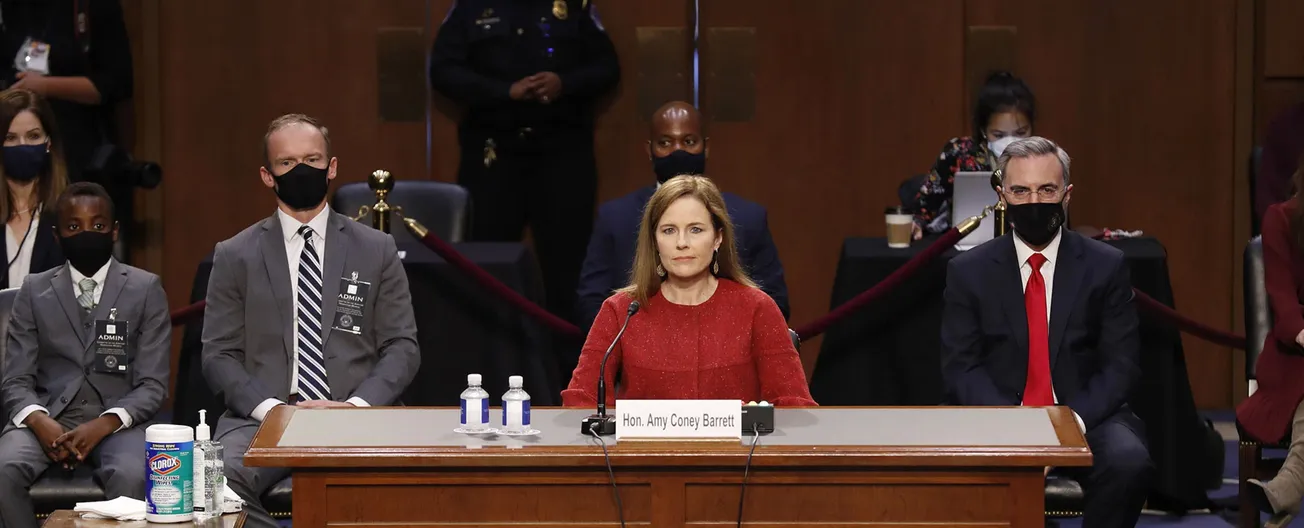Table of Contents
The Supreme Court is under attack. In the past few years, politicians and ideological media have repeatedly polarized the Supreme Court. Criticism of Supreme Court nominees has moved from well-founded inquiries based on judicial history to the private lives of nominees. Amy Coney Barett was questioned for her Catholic Faith, when critics insinuated that her religion made her an enemy of women's rights, while Justice Neil Gorsuch suffered a baseless accusation of plagiarism. Justices’ personal perspectives have been conflated with their actions on the Court, with Senator Elizabeth Warren recently decrying Justice Sam Alito as a “political hack.” The late Justice Ruth Bader Ginsburg may be the last deceased justice treated with relative bipartisan civility.
This excessive polarization has corroded public trust in the legal system. How can we seek unity when we can’t even agree on a set of standards for truth and justice?
Politicization has fostered distrust between the Supreme Court and other branches of the government. If politicians see Courts as political institutions, they will feel compelled to launch partisan attacks against it. The executive branch may not faithfully follow and execute the rulings of the courts if they feel that it is politically motivated against their party. Likewise, legislators may choose to bypass the judicial branch through jurisdiction stripping if they find it to be politically hostile.
When politicians portray the Supreme Court as politically charged, the public will similarly distrust the Supreme Court. If the public believes that Supreme Court rulings are politically charged, we may risk the same situation in lower courts and the public may refuse to follow court rulings.
The politicization of the Court isn’t just dangerous. It’s also wrong on the facts. The conservative and liberal wings of the Supreme Court do not follow hardline party loyalties. Instead, conservative and liberal judges often work together to uphold a shared view of the Constitution. For example, Justices Gorsuch and Kavanaugh both voted to defend the right for foreign residents in the US to challenge their deportation in Guerrero-Lasprilla v. Barr. On the other hand, four liberal Justices voted to block House Democrats from launching a subpoena on President Trump’s financial records despite their political alignment.
We should not view the Supreme Court as a politically-motivated battleground, but as a disinterested forum over the Constitution and its underlying philosophy as originally intended. Most Supreme Court decisions are made unanimously. From 2016 to 2020, 43% of Supreme Court cases were decided unanimously, while only 21% of cases were decided by a one-vote margin.
In recent years, justices have become often misleading symbols and caricatures for political movements. Through books and movies, the late Justice Ginsburg morphed into a progressive icon despite her long history of bipartisan respect, friendship with Scalia, and defense of Justice Kavanaugh. She became a target of unjustified right-wing attacks and a symbol of progressive values, even those contrary to her personal beliefs.
For example, while Ginsburg was a defender of legal access to abortion, she had reservations towards Roe v. Wade. She believed that ruling to be too sweeping and would have preferred it to be resolved in a more inclusive legislative process.
To combat the increased polarization of the Supreme Court, many have denounced it as a powerful organization unaccountable to voters and Democratic figures propose court-packing. But these moves are unnecessary and only exacerbate the problem. The power of the Supreme Court is already largely limited to judicial review: it can only strike down statutes and presidential directives that violate the Constitution. By relying on sensationalism, politicians have revealed that their goal is not to improve the legal system, but to agitate for greater polarization.
The United States is a nation founded by lawyers. From the drafting of the Constitution, the Supreme Court has been representative of a national tradition. As each generation of Justices debate and deliberate, they are not merely engaging the Constitution in its application -- they extend the philosophical foundations of America through published legal opinions. As the Poet Laureate works to elevate the national conscience through poetry, so are the Supreme Court justices Philosopher Laureates, strengthening the spiritual and philosophical heart of the nation. End the politicization, and defend the Supreme Court.








